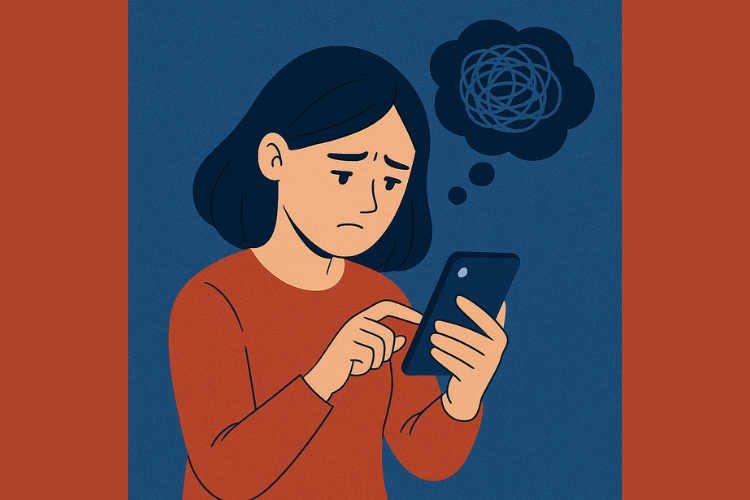Introduction
Social media has become a vital part of modern life, especially for young adults. Platforms like Instagram, TikTok, and Facebook serve as spaces to connect, share experiences, and stay updated. However, with its widespread use comes an important question: Does social media cause anxiety, or are anxious young adults drawn to it for comfort? Researchers from the University of Connecticut and Connecticut Children’s Medical Center conducted a study to explore this connection. Surveying 563 participants aged 18 to 22, they discovered a clear pattern—more time spent on social platforms often came with more frequent anxiety symptoms. This finding raises a deeper concern about how online habits influence mental health.The Study at a Glance
The study focused on 563 young adults, all between 18 and 22 years old. Each participant reported their anxiety symptoms and explained how these symptoms impacted their daily routines. They also shared details about the amount of time they spent on social media.
Results showed a significant correlation: the more time spent on these platforms, the higher the chances of experiencing anxiety. This link was especially strong among participants who visited social media sites daily.
This raises the critical question: are these platforms causing anxiety, or are anxious individuals using them as a way to cope?
Does Social Media Contribute to Anxiety?
One explanation is that social media itself can heighten anxiety. Platforms often showcase highlight reels of people’s lives—celebrations, achievements, and milestones—while leaving out the ordinary struggles everyone faces.
This constant stream of curated content creates a distorted reality. When young adults scroll through feeds filled with accomplishments and picture-perfect moments, it can spark feelings of inadequacy. The saying “Comparison is the thief of joy” fits perfectly in this context.
Psychologists refer to this as the “Facebook effect,” where seeing others’ successes online can trigger self-doubt and anxious thoughts. The fear of missing out (FOMO) intensifies this effect, making young adults feel left behind or less successful.
For individuals in this age group, who are still exploring careers, relationships, and personal identity, this comparison trap can be particularly damaging.
Or Are Anxious People Using Social Media to Cope?
Another perspective suggests the opposite: instead of social media causing anxiety, anxious individuals may turn to it as an escape. Platforms offer instant validation through likes, comments, and interactions, which can feel comforting.
Scientific studies show that positive engagement on social media triggers dopamine, the brain’s reward chemical. For someone battling anxiety, even a small dopamine boost can offer temporary relief.
The convenience of smartphones adds to this cycle. With social platforms only a swipe away, young adults can quickly distract themselves from anxious thoughts or loneliness. While this might help in the moment, it doesn’t address the root of their anxiety, often making the problem return stronger.
The Digital Cycle: How Both Theories Interconnect
The truth is that both explanations may be correct, creating a self-reinforcing digital cycle.
- Anxiety makes a young adult reach for social media.
- On social media, they encounter others’ highlight reels.
- Comparing their own life to these curated images increases their anxiety.
- They return to social media for temporary comfort.
This loop repeats, building a dependency that can be hard to break. Over time, the brain begins to associate social platforms with relief, even though they also fuel the very anxiety they are used to escape.
For young adults, this pattern can have lasting effects on mental health, leading to chronic stress, low self-esteem, and in some cases, depression.
Breaking the Cycle: Practical Tips
Completely leaving social media isn’t realistic for many young adults. These platforms are deeply integrated into their social, educational, and professional lives. Instead, the goal should be creating balance and mindful usage.
1. Set Boundaries and Breaks
Schedule regular offline time. Even small breaks can reduce overuse and allow the brain to reset. Tools and apps that track screen time or limit access can help enforce these boundaries.
2. Curate a Positive Feed
Follow accounts that inspire and uplift rather than those that trigger unhealthy comparisons. Muting or unfollowing stressful content creates a healthier digital space.
3. Check Your Motives
Before opening an app, pause and ask: Am I logging in because I’m anxious, bored, or lonely? Being aware of your emotions helps you use social media intentionally.
4. Find Offline Alternatives
Engage in hobbies, exercise, or creative projects that offer a sense of accomplishment outside of the digital world. Offline activities provide validation that doesn’t depend on likes or followers.
5. Seek Professional Help if Needed
If anxiety feels overwhelming, therapy or counseling can provide tools to manage it effectively. Cognitive-behavioral therapy (CBT) is especially useful for breaking negative patterns linked to social media.
Building Healthier Digital Habits
Parents, mentors, and educators can also help. Encouraging open discussions about mental health and online behavior helps young adults understand the effects of their digital choices. Schools and universities can incorporate digital wellness programs to promote balanced technology use.
Conclusion
Social media is not inherently harmful or beneficial—it’s a tool, and its impact depends on how it’s used. The University of Connecticut and Connecticut Children’s Medical Center study highlights a vital reality: the link between social media and anxiety is complex, often working in both directions for young adults.
The key to breaking the anxiety loop is awareness and intentional use. Setting limits, curating content, and replacing online validation with offline activities can help build a healthier relationship with these platforms.
For families and individuals seeking a more controlled digital environment, tools like CleanRouter offer a way to manage online access and promote healthier habits. Ultimately, creating balance and prioritizing mental well-being can help young adults reclaim control over their digital and emotional lives.




